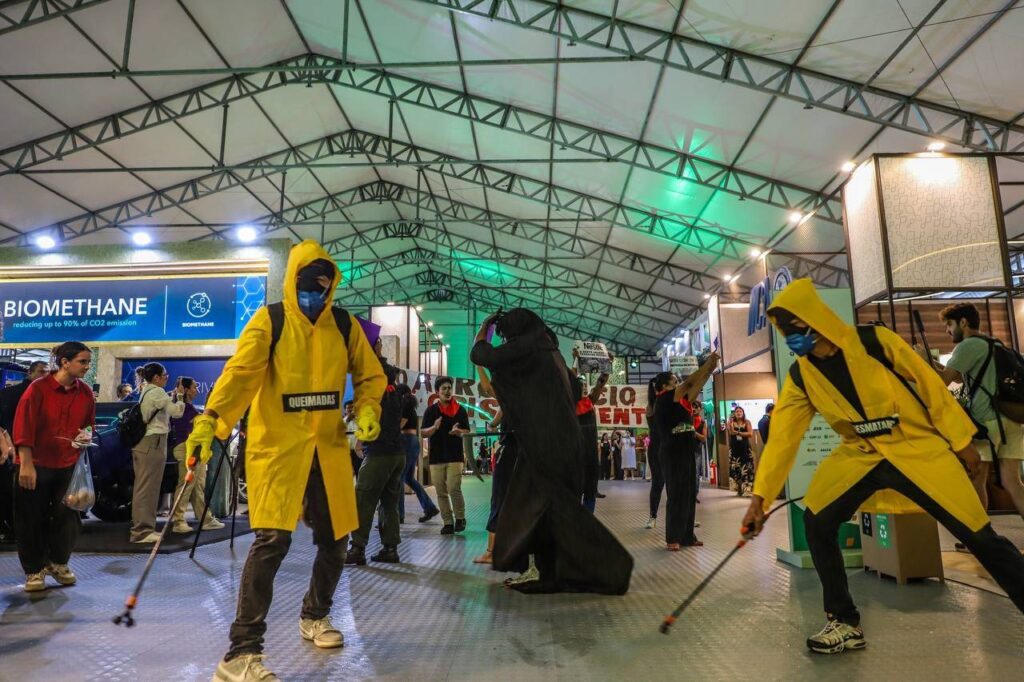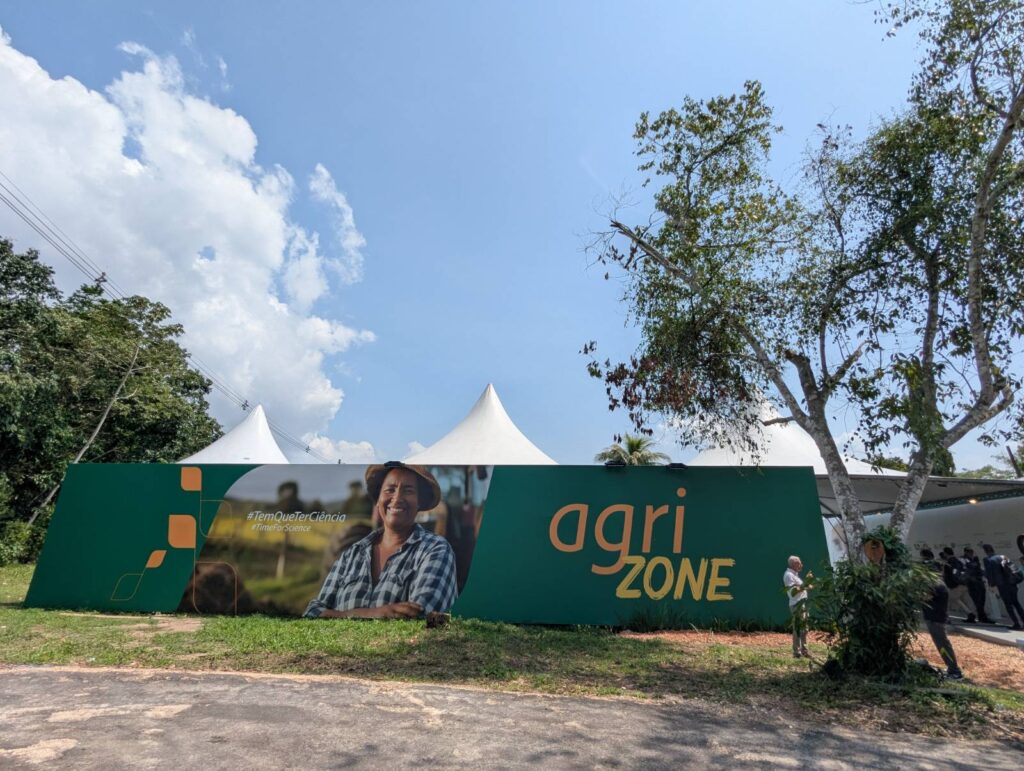The U.S. meat industry has engaged in intrusive surveillance of animal rights groups, including monitoring relationships between activists and tracking employees of leading charities.
The industry-funded Animal Agriculture Alliance (AAA) shared information with livestock companies about the romantic partners and even biological ties of those in animal rights organisations.
Documents seen by DeSmog show that in one instance the group shared the location and a photo of an activist’s girlfriend with industry members who were passing intelligence to the local sheriff.
Part funded by public money, the AAA created a database of over 2,400 individuals including those who simply “affiliate” on social media with animal rights groups. The database also included “suspicious individuals” at animal rights protests, and those who have tried to film or report on conditions at farms.
“It’s a chilling intrusion into people’s private lives and constitutional rights,” said Ben Williamson of the animal rights organisation Animal Outlook, which is listed by the AAA as an “extreme” group.
The livestock industry accounts for over 14 percent of all emissions worldwide, and scientific experts agree that it must rapidly transform to meet international climate obligations.
DeSmog analysed hundreds of pages of leaked documents produced between 2015 and 2025. They provide a snapshot of the tactics used by the meat and dairy industry to undermine and discredit criticisms of the sector as it faces growing pressure to address animal welfare and environmental harms.
The AAA is a meat and dairy industry coalition that was set up to protect the sector against “emerging threats”. The group’s influence has been widespread. In 2019 it persuaded the Mayor of Minneapolis to withdraw support for a “Meatless Mondays” school campaign, and in the same year it orchestrated a “mud slinging” campaign against a flagship scientific report that called for cuts to meat and dairy consumption. The organisation has a direct line to staff at the Federal Bureau of Investigation (FBI), and the Department of Homeland Security (DHS), according to investigations published by Wired and The Intercept.
Research by DeSmog also shows that the AAA has regularly briefed federal and state departments on what it describes as “extreme activities” – a broad definition that includes everything from arson and harassment to banner drops and “observation” of conditions on farms, according to the group’s website.
It has also worked with a private security firm to provide weekly email briefings on activist organisations to corporate interests and government officials.
Subscribe to our newsletter
Stay up to date with DeSmog news and alerts
The AAA received over £1.1 million in funding in 2023, the majority from its members in the meat, dairy, animal pharmaceutical, and animal feed sectors. Its board includes staff from two of the five largest meat companies in the world, Cargill and Smithfield Foods, while it has also received finance from publicly-funded trade groups overseen by the U.S. Department of Agriculture (USDA).
The USDA has aligned closely with the livestock sector under Donald Trump’s second administration, which has overseen decisions to withdraw proposals for stronger safety testing of raw poultry and scrapped plans to curb pollution from slaughterhouses and meat plants.
Trump’s own 2025 inauguration ceremony received over $5 million from Pilgrim’s Pride, a subsidiary of world’s biggest meat producer JBS, making the company the largest corporate donor to the event.
DeSmog’s new findings follow years of lobbying by the meat industry to institute increasingly harsh laws limiting animal rights activists. Since 2006, those planning or attempting to “damage” an animal enterprise can be convicted as terrorists under federal law.
Will Potter, a journalist and author specialising in opposition to animal rights activism, told DeSmog he was concerned about how surveillance tactics may escalate under Trump, who has empowered the federal government to target his political opponents with criminal investigations and even deportations.
“No other protest group has been so targeted since 9/11 as a terrorist threat,” Potter said. “I expect these types of tactics, which have been pioneered against animal rights activists, to become the playbook for going after other movements, in the U.S. and globally,” he added.
“It doesn’t matter how you feel about animal rights activists, or if you’re vegetarian. You have to understand how this works. Because it’s going to be applied elsewhere.”
The AAA’s director of communications Emily Ellis told DeSmog: “The Alliance categorically rejects the characterization of our work in your inquiry. The Alliance shares relevant information and resources that are helpful to the food community but does not seek to influence or direct the actions of any organization or law enforcement.”
She added: “Our mission is to safeguard the future of animal-sourced foods and their value to society by bridging the communication gap between the farm and food communities. We connect key food industry stakeholders to equip them with responses to emerging issues, engage food chain influencers, and promote consumer choice by helping them better understand modern animal agriculture.”
Ellis did not respond to questions about the AAA’s surveillance work or the nature of information on activists that it had shared with law enforcement.
Surveilling Individuals
More than 400 pages of documents seen by DeSmog – including emails, meeting minutes, and online resources created by the AAA – point to a concerted effort by the group to track thousands of individuals.
According to the minutes of meetings between 2015 and 2020, the AAA created “in-depth individual profiles on repeat undercover activists”, as well as a list of people who have signed up “to activist groups on Facebook”, and a database of over 2,400 individuals.
While this database is not publicly available, documents seen by DeSmog provide a snapshot of the information shared with the AAA’s meat industry members.
In an email chain from 2020, the alliance provided almost real-time updates on the location of activist Matt Johnson – a member of the activist group Direct Action Everywhere (DxE) – who had returned to his home town in Iowa for his birthday, based on posts from his social media.
Emailing the communications director of the Iowa Pork Producers Association, the AAA discussed the best options for “calling Ken” – Iowa’s Republican Senator Ken Rozenboom, who is also a pig farmer in the area and has been a leading advocate for stricter laws against activists filming on farms. Johnson had said on social media that he hoped to speak to Rozenboom during his time in the state.
AAA CEO Hannah Thompson-Weeman provided the name and an image of Johnson’s girlfriend, who was also in Iowa. “Folks should be on the lookout for her as well,” she told the communications director, who in turn told the AAA that “the sheriff in the area has been notified”.
In a 2023 ‘dossier’, the alliance listed “individuals and organizations [that] are suspected to be involved with plans for activist activity during the 2023 Minnesota State Fair” – an annual gathering of farmers and locals. The dossier included images of activists, links to their social media pages and, on one occasion, information about who they were in a relationship with.
The alliance has also mapped personal ties between staff at well-known animal welfare groups, such as Compassion in World Farming, and Mercy for Animals, including their “biological or marriage relationship[s]”.
The groups monitored by the AAA included even the most cautious animal rights activists. Organisations that the AAA considers “high risk” to the livestock industry range from civil disobedience groups like DxE to household non-profits such as Humane World for Animals (formerly Humane Society of the United States) and PETA.
On 18 September, the Fair Agriculture Council (FAC) sent nonprofits their individual surveillance profiles, giving them an opportunity to see the files kept on them. Several organisations that have been tracked by the AAA – including environmental group Mighty Earth, and animal welfare groups PETA, Compassion in World Farming, Animal Outlook, and Our Honor – condemned the surveillance.
“These leaked documents confirm their playbook: smear veterinarians and advocates to protect corporate interests, rather than supporting effective, sustainable food production,” said Dr Crystal Heath, executive director of Our Honor, a network of veterinarians.
In 2020, Heath was the subject of an AAA “alert” sent to the group’s California members. It accused her of “extreme activism” after she campaigned against the use of a slaughterhouse technique called ventilation shutdown, where pigs are killed by extreme heat and cutting off their air supply.
“It is troubling that corporate interests are spying on activists who are trying to protect the public from the actions of these corporations,” said Adam Schwartz of the digital rights and privacy group Electronics Frontier Foundation, who added that big businesses had been known to “give these [kinds of] dossiers to police departments” or the FBI.
Such information sharing could have a “chilling effect” on “activists who are following the law and engaging in First Amendment activities”.
Wired revealed in June that “undercover operators for the AAA embedded within the animal rights group [Direct Action Everywhere] and fed the trade organization daily reports about protests and meetings, as well as photographs, audio recordings, and other documentation.”
Little is known on how the AAA’s profiles are used. However, evidence suggests that the alliance has used them to undermine critics of the meat industry.
Concerned that two former senators, Bob Dole and Bob Kerrey, had joined the animal rights group the Humane Society of the United States as special advisors in 2015, the alliance “shared some of our activist profile resources” with a “personal contact” – a former staff member of Senator Dole – “to use in personal conversations”.
The group also shares weekly updates on “animal rights extremist activity” via an email newsletter, which reports on recent and planned protests, including sharing the names of individual activists involved. Freedom of information requests show that recipients include government officials, as well as alliance members.
State Funding
Public money has been funding these activities.
Sixty percent of the AAA’s funding comes from fees that are paid annually by members, with membership categories costing between $1,500 and over $50,000 dollars. While the alliance does not publish a membership list, according to minutes from a 2018 meeting, it has “a number [of members …] who are checkoffs or are publicly funded institutions.”
Checkoffs are trade groups overseen by the USDA to promote commodities including beef, pork and dairy. They are funded through mandatory levies paid by all farmers in the sector. Checkoff-funded members of the alliance include the National Pork Board, and Dairy Management Inc..
In 2020, the alliance wrote to the National Pork Board requesting payment of an annual $10,000 fee to renew its membership. It thanked the organisation for its previous year’s “contribution”, which “helped the alliance” “issue 21 alerts on activist activity” and debut the “new Activist Database” of more than 2,400 names.
Checkoffs have been accused of using taxes on all farmers to promote the interests of large scale industrial farms over small scale producers, and have faced lawsuits alleging that they force producers to pay for activities they wouldn’t otherwise choose to support.
“It is outrageous that public bodies like the National Pork Board are bankrolling covert surveillance campaigns against some of the world’s most respected non-profits”, said Matthew Dominguez, executive director of Compassion in World Farming U.S..
The USDA did not reply to request for comment.
PR and Private Security Support
The alliance has been assisted in its intelligence gathering by professional security and PR firms.
According to a 2023 copy of the alliance’s “Animal Ag Activism Update”, which is sent to all members weekly, the newsletter was created in “partnership” with the Information Network Associates (INA), a private security firm. “INA provides timely and actionable intelligence to animal agricultural industries to mitigate risk from animal rights extremists,” the newsletter states.
The INA was previously implicated in a 2022 lawsuit brought by animal rights organisation PETA, after it found that the police department at Oregon Health & Science University (OHSU) was receiving “near-daily intelligence-style updates” on PETA from the firm. A judge ruled that the department had “illegally surveilled” the organisation by receiving information from the INA.
‘Extremist Groups’
Privacy advocates and civil society groups say that the AAA’s surveillance raises acute concerns given the group’s access to law enforcement officials.
The Intercept revealed in June that the AAA had lobbied the FBI to consider animal rights activists as a bioterrorism threat. The alliance reportedly told its members in 2020 that it would reach out to “our FBI and DHS contacts to raise our concerns,” after DxE launched an interactive online map providing the addresses of animal farms across the country.
Documents seen by DeSmog suggest that these efforts are part of broader concerted attempts by the alliance to shape the stance of law enforcement agencies.
The documents include a contact list for directors of fusion centers – agencies set up by states, often with FBI support, in the wake of 9/11 to counter terrorist threats – and they show that the alliance regularly briefs law enforcement groups.
“Alliance staff have regularly given activist update presentations to law enforcement audiences,” the organisation told members of its ‘security committee’ in October 2023.
Such presentations have been given to Fusion Centers, which have been criticised by civil rights organisations for their alleged privacy breaches during domestic intelligence gathering, as well as for their “excessive secrecy”.
Other audiences have included the Critical Infrastructure Partnership Advisory Council, which was established by the DHS to improve the protection of “critical industries” until its closure by Trump in February this year. The council was attended by staff from the FBI and USDA, among others. Internal minutes show that the AAA’s presentations covered “animal rights extremist tactics and threats to farms and the food industry” and led to speaking opportunities with “other government agencies”.
While the exact content of the presentations is unknown, meeting minutes suggest that the alliance spoke about activists monitoring farms and documenting animal welfare issues, “begging drivers to release animals” being transported by truck, “as well as constructing roadside memorials for animals killed in transport accidents”. They described all of the above as “extreme activities”.
Potter, author of Green is the New Red, believes that the AAA and other industry groups are purposefully using an increasingly broad definition of extremism to target campaign groups.
“These [campaigners] are in the public. They are above ground, taking responsibility for their peaceful civil disobedience,” he said. “They are such a far cry from anything that can be called terrorism, but the industry is going full steam ahead.
“You start by going after people who are more fringe in their beliefs or tactics, and then group everyone together around this. [The AAA] haven’t just been going after civil disobedience or direct action, they’ve been going after the most mainstream organisations.”
He added: “The continuous creep from the margins to the mainstream is textbook authoritarianism.”
The FBI told DeSmog that it “frequently shares information with law enforcement partners and with members of the private sector.”
It added: “Our goal is to protect our communities from unlawful activity while at the same time upholding the Constitution […] The FBI can never open an investigation based solely on First Amendment protected activity.”
It declined to comment on the nature of its relationship with the AAA.
DHS did not reply to requests for comment.
Shaping Government Crackdown
The AAA’s work forms part of successful efforts by the meat industry to ensure an increasingly tough government response to animal rights activism in the U.S. over recent decades.
In the 1990s, the Animal Industry Foundation (AIF) – which became the Animal Agriculture Alliance in 2001 – led an industry coalition calling on Congress to make “animal rights violence” a federal crime. AIF founder and PR consultant Steve Kopperud said that lobbying for the bill – which passed in 1992 – was “one of the prouder moments of my life”.
In the following years, industry representatives including the National Cattlemen’s Beef Association, an AAA member, lobbied to extend the laws so that activists could be convicted as “terrorists”.
These efforts were supported by the free market American Legislative Exchange Council (ALEC), which drafted an early version of the legislation. Its former affiliates include major meat and dairy processors like Kraft Foods, McDonald’s, and Mars, alongside animal pharmaceutical companies such as Merck, a staff member from which sits on the board of the AAA.
The result was the 2006 Animal Enterprise Terrorism Act (AETA), which labelled “damaging or interfering” with an animal enterprise, or planning such an act, a terrorist offence. The law introduced sentences of up to 20 years for property damage, even where no person was harmed.
Potter says that while there have been few prosecutions under either state or federal laws, the legislation has had a “dangerous” chilling effect on protest, with a “pronounced decline in civil disobedience and direct action in recent years because of the ‘terrorism’ rhetoric.”
He added: “There has been widespread fear from grassroots groups all the way up to national mainstream organisations, and everything in between.
“Countless people have asked: can I do this? Will I be labelled a terrorist? Will I be convicted?”
Since the 1990s, 12 states have introduced their own ‘ag gag’ laws, which effectively criminalise undercover attempts to record conditions on farms. Several have been struck down by courts as unconstitutional.
“Big Ag has unfairly poisoned the attitudes of law enforcement for years by engaging in this kind of unethical and improper activity,” a spokesperson for PETA U.S. told DeSmog.
“The real extremists are those so desperate to cling to the the old way of life… that they’ll stoop to employing surveillance tactics against people who speak out against the terror inflicted on animals.”
Subscribe to our newsletter
Stay up to date with DeSmog news and alerts






